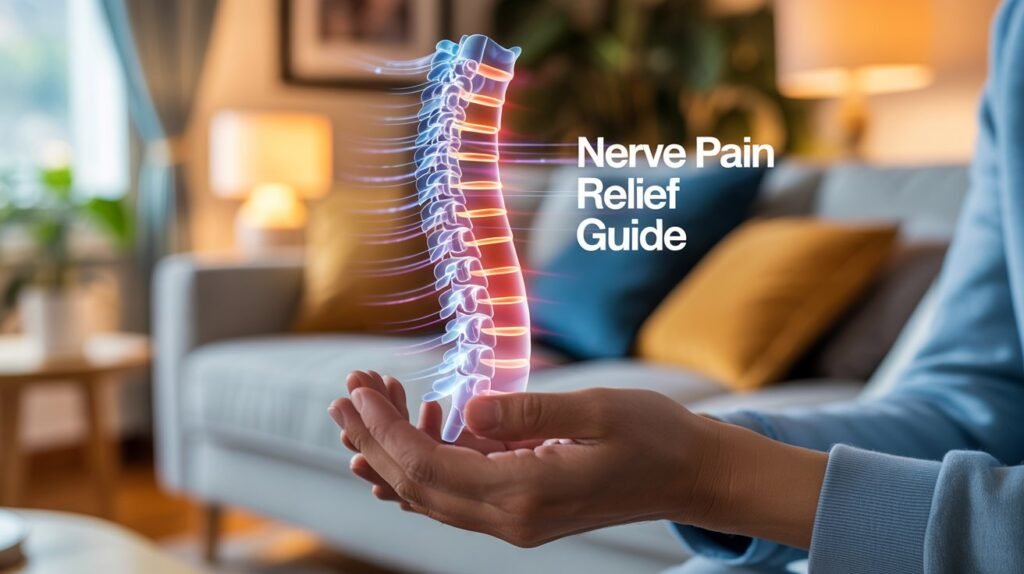Living with nerve pain can feel like a never-ending battle.
That constant tingling, burning, or sharp stabbing sensation can drain your energy, disturb your sleep, and affect your daily life.
The good news is, there are many ways to find nerve pain relief, both naturally and with medical support.

In this guide, we’ll explore everything you need to know about managing nerve pain, from understanding its causes to finding effective home remedies for nerve pain and advanced treatments that actually work.
What Is Nerve Pain?
Nerve pain happens when nerves send false or excessive pain signals to the brain.
Unlike a bruise or muscle injury that heals with time, nerve pain often sticks around because the root cause isn’t addressed.
It can affect any part of your body, hands, feet, back, or even your face, and ranges from mild discomfort to severe, debilitating pain.
It’s more common than most people realize. According to the National Institute of Neurological Disorders and Stroke, over 20 million people in the U.S. suffer from some form of peripheral neuropathy.
This type of pain is different from regular muscle or joint pain. It can feel like:
- Tingling or “pins and needles”
- Burning or stabbing pain
- Numbness or loss of sensation
- Unexplained sensitivity to touch
If you’ve been searching for ways to get relief, you’re not alone, and this guide will help you take the first step toward real solutions.
Types of Nerve Pain
Different types of nerve pain need different approaches. Here are the most common forms:
- Peripheral Neuropathy: Usually affects hands and feet, often caused by diabetes, vitamin deficiencies, or infections.
- Sciatica: Pain that runs from your lower back down to your leg due to nerve compression.
- Diabetic Neuropathy: Nerve damage caused by high blood sugar levels.
- Postherpetic Neuralgia: Nerve pain that lingers after a shingles infection.
- Pinched Nerves: Compression from posture problems or injuries.
Knowing the type of nerve pain you have is the first step toward finding the right solution.
Common Causes of Nerve Pain
Nerve pain doesn’t just happen out of nowhere. Some common triggers include:
- Injuries or accidents: Physical trauma that damages nerves.
- Chronic health conditions: Diabetes, arthritis, or autoimmune disorders.
- Infections: Such as shingles, Lyme disease, or HIV.
- Vitamin deficiencies: Lack of B vitamins, which are crucial for nerve health.
- Poor lifestyle habits: Smoking, alcohol, or prolonged poor posture.
Understanding the cause helps in choosing the most effective nerve pain treatment at home or with professional help.
Symptoms and Early Warning Signs
Catching nerve pain early can help prevent long-term damage. Look out for these signs:
- Tingling or “pins and needles” in your hands or feet
- Burning sensations that don’t go away
- Sharp, shooting pain in specific areas
- Loss of balance or muscle weakness
- Extreme sensitivity to temperature or touch
If you notice these symptoms, don’t ignore them. Early intervention often makes a huge difference in recovery.
Medical Treatments for Nerve Pain
When nerve pain becomes too much to handle with simple remedies, medical treatments can provide relief.

Let’s break down the most common options:
Over-the-Counter (OTC) Medications
If you’re wondering, “What is the best over-the-counter medicine for nerve pain?”, here are a few commonly used ones:
- Acetaminophen (Tylenol) – Good for mild pain but may not help with nerve-specific discomfort.
- Ibuprofen (Advil, Motrin) – Reduces inflammation that can aggravate nerve pain.
- Topical creams and gels – Products containing capsaicin or lidocaine can numb localized pain.
While OTC medications can help, they often work best when combined with other treatments like therapy or supplements.
Prescription Treatments
For moderate to severe cases, doctors may recommend:
- Antidepressants: Such as amitriptyline or duloxetine, target nerve pain signals.
- Anticonvulsants: Gabapentin or pregabalin, often used for nerve-related conditions.
- Opioids: These are less common due to risks of dependency, but they may be used in severe, short-term cases.
If you’re asking, “What is a good painkiller for nerve pain?”, gabapentin and duloxetine are two commonly prescribed options with proven results.
Interventional Therapies
For patients who don’t respond to medications alone, doctors may recommend advanced treatments:
- Nerve blocks: Injections that numb the affected nerve area.
- Transcutaneous Electrical Nerve Stimulation (TENS): Sends mild electrical signals to reduce pain perception.
- Physical therapy: Helps improve mobility, posture and reduces nerve compression.
Natural and Home Remedies for Nerve Pain
Not everyone wants to rely on medication long-term, and that’s where nerve pain home remedies can be life-changing. These simple yet effective natural methods support nerve healing while reducing daily discomfort.
These natural approaches support nerve healing while reducing daily discomfort.

Lifestyle Changes
- Exercise and Stretching
Regular walking, swimming, or yoga improves circulation and reduces inflammation. Exercise also releases endorphins, your body’s natural painkillers. - Balanced Diet
A diet rich in omega-3 fatty acids, lean proteins, and B vitamins supports nerve repair. Include foods like fish, eggs, nuts, and leafy greens. - Proper Posture
Poor posture is one of the hidden causes of nerve compression. Ergonomic chairs and frequent breaks during work can make a big difference.
Herbal and Natural Supplements
Some supplements have shown promise in supporting nerve health:
- Alpha-lipoic acid: Known for reducing symptoms of diabetic neuropathy.
- Curcumin: Found in turmeric, it has natural anti-inflammatory properties.
- Vitamin B12: Crucial for nerve regeneration and overall health.
- Magnesium: Helps relax muscles and reduce nerve tension.
Stress Management Techniques
Stress worsens nerve pain by increasing inflammation and muscle tension. Simple practices like:
- Meditation or mindfulness
- Deep breathing exercises
- Yoga or tai chi
These not only calm the mind but also improve physical well-being.
Hot and Cold Therapy
Alternating between hot and cold packs can help:
- Heat therapy relaxes muscles and improves blood flow.
- Cold therapy reduces inflammation and numbs sharp pain.
This combination is a simple yet effective nerve pain treatment at home.
Advanced Therapies and Emerging Treatments
For those who have tried medications and home remedies for nerve pain but still struggle, newer options are showing promise.

Regenerative Therapies
- Stem Cell Therapy: Helps repair damaged nerves at the cellular level.
- Platelet-Rich Plasma (PRP): Uses your body’s platelets to promote healing and reduce inflammation.
These are still emerging options and can be costly, but many patients report significant improvement.
Acupuncture and Alternative Medicine
Acupuncture stimulates specific points in the body to release endorphins and improve nerve function.
Studies have shown it can be particularly helpful for chronic neuropathy and sciatica.
Cutting-Edge Research
Researchers are exploring gene therapy and neurostimulation devices to offer long-term solutions for chronic nerve pain.
While not mainstream yet, these breakthroughs hold hope for millions.
Prevention Tips for Nerve Pain
Preventing nerve pain is often easier than treating it. Here are practical tips you can start today:
- Maintain a Healthy Weight: Excess weight puts pressure on nerves, especially in the lower back and legs.
- Control Chronic Conditions: Managing diabetes or high blood pressure reduces your risk of nerve damage.
- Stay Active: Movement keeps your nerves and muscles healthy.
- Avoid Repetitive Strain: Take breaks during long typing sessions or physical labor.
- Get Regular Check-Ups: Early detection can prevent minor issues from turning into chronic problems.
When to See a Doctor
While nerve pain treatment at home can be effective for mild cases, there are times when professional help is crucial.
Seek medical attention if you experience:
- Sudden or severe pain
- Loss of bladder or bowel control
- Muscle weakness or paralysis
- Pain after a recent injury
- Numbness spreading to other areas
Prompt diagnosis can prevent permanent nerve damage and improve recovery outcomes.
Daily Coping Strategies
Living with nerve pain is challenging, but these coping strategies can help you take control of your life:
- Keep a Pain Journal: Track triggers, intensity, and what treatments help. This is useful for doctor visits, too.
- Join Support Groups: Sharing experiences with others can provide comfort and practical tips.
- Set Realistic Goals: Small achievements like walking for 10 minutes daily can boost your confidence.
- Prioritize Sleep: Good rest is essential for nerve healing and overall pain management.
FAQs About Nerve Pain Relief
What is the fastest way to relieve nerve pain?
Combining heat and cold therapy with over-the-counter pain relievers is often the quickest way to get temporary relief.
Can nerve pain go away on its own?
Sometimes, especially if caused by a minor injury or temporary inflammation. But chronic conditions like diabetic neuropathy usually need treatment.
What is a good painkiller for nerve pain?
Gabapentin and duloxetine are commonly prescribed. For milder cases, ibuprofen or acetaminophen may help, but are less effective for nerve-specific pain.
What is the best over-the-counter medicine for nerve pain?
Ibuprofen, acetaminophen, or topical creams with lidocaine or capsaicin are widely used for temporary relief.
Are there effective home remedies for nerve pain?
Yes! Exercise, proper nutrition, B12 supplements, and stress management techniques can provide lasting relief when practiced consistently.
Final Thoughts
Nerve pain can feel overwhelming, but it doesn’t have to control your life.
By combining medical treatments, home remedies for nerve pain, and lifestyle changes, you can manage symptoms, reduce flare-ups, and even heal over time.
Remember:
- Early action is key.
- Stay consistent with your treatment plan.
- Always consult a healthcare professional before starting new medications or supplements.
With the right approach, nerve pain relief is possible—and a pain-free, active life can be within reach.